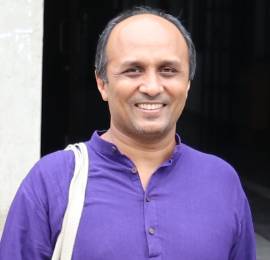Centre for Teaching & Learning hosts webinar on ‘Experiences in Hands-on Experiential Education: The Secret Sauce of Future-Proof Learning’ on 15th December

Session led by Prof. Manish Jain, IIT Gandhinagar and Prof. Sushanta Kumar Mishra, IIM Bangalore
18 December, 2023, Bengaluru: The Centre for Teaching and Learning (CTL) at IIM Bangalore hosted an online discussion titled, ‘Experiences in Hands-on Experiential Education: The Secret Sauce of Future-Proof Learning’, on 15th December 2023, as part of its Samiksha series of webinars.
The session was led by Prof. Manish Jain, IIT Gandhinagar, along with Prof. Sushanta Kumar Mishra, Chairperson, Centre for Teaching and Learning, Research and Publications and C-DOCTA, and faculty of the Organizational Behavior & Human Resources Management area, IIM Bangalore.
Prof. Manish Jain highlighted the importance of action-based learning, adding, “Our goal is to make learning engaging and inspiring, and bring back that gleam in the eyes of children.”
According to him, physical experiments can not only help make learning engaging, but also give young learners an opportunity to think, observe and wonder. “The idea of young learners having a short attention span is a myth. It is the process of learning that can make a huge difference.” In line with this, he cited an example where his team had engaged a group of 350 students to create a logo by weaving lines within a circle. It had taken each student eight hours to complete the entire logo. “The prospect of creating something interesting and thoughtful helped the students stay on the task for hours on end, without getting bored or losing attention. The skill of doing something by hand creates the ability to persevere. Learners can derive a sense of achievement, which is intangible but can boost confidence.”
He went on to showcase a few experiments based on topics such as Pingala’s binary representation theory, frequency of sound, magnetic field, etc.
Prof. Sushanta Mishra added constructive weight to the discourse by pointing out how academicians struggle between creating knowledge and disseminating it. He concluded the session by summarizing the key learnings and delivering the vote of thanks.
Watch the discussion here: https://www.youtube.com/watch?v=ezHnEhTpmlo
Centre for Teaching & Learning hosts webinar on ‘Experiences in Hands-on Experiential Education: The Secret Sauce of Future-Proof Learning’ on 15th December
Session led by Prof. Manish Jain, IIT Gandhinagar and Prof. Sushanta Kumar Mishra, IIM Bangalore
18 December, 2023, Bengaluru: The Centre for Teaching and Learning (CTL) at IIM Bangalore hosted an online discussion titled, ‘Experiences in Hands-on Experiential Education: The Secret Sauce of Future-Proof Learning’, on 15th December 2023, as part of its Samiksha series of webinars.
The session was led by Prof. Manish Jain, IIT Gandhinagar, along with Prof. Sushanta Kumar Mishra, Chairperson, Centre for Teaching and Learning, Research and Publications and C-DOCTA, and faculty of the Organizational Behavior & Human Resources Management area, IIM Bangalore.
Prof. Manish Jain highlighted the importance of action-based learning, adding, “Our goal is to make learning engaging and inspiring, and bring back that gleam in the eyes of children.”
According to him, physical experiments can not only help make learning engaging, but also give young learners an opportunity to think, observe and wonder. “The idea of young learners having a short attention span is a myth. It is the process of learning that can make a huge difference.” In line with this, he cited an example where his team had engaged a group of 350 students to create a logo by weaving lines within a circle. It had taken each student eight hours to complete the entire logo. “The prospect of creating something interesting and thoughtful helped the students stay on the task for hours on end, without getting bored or losing attention. The skill of doing something by hand creates the ability to persevere. Learners can derive a sense of achievement, which is intangible but can boost confidence.”
He went on to showcase a few experiments based on topics such as Pingala’s binary representation theory, frequency of sound, magnetic field, etc.
Prof. Sushanta Mishra added constructive weight to the discourse by pointing out how academicians struggle between creating knowledge and disseminating it. He concluded the session by summarizing the key learnings and delivering the vote of thanks.
Watch the discussion here: https://www.youtube.com/watch?v=ezHnEhTpmlo
